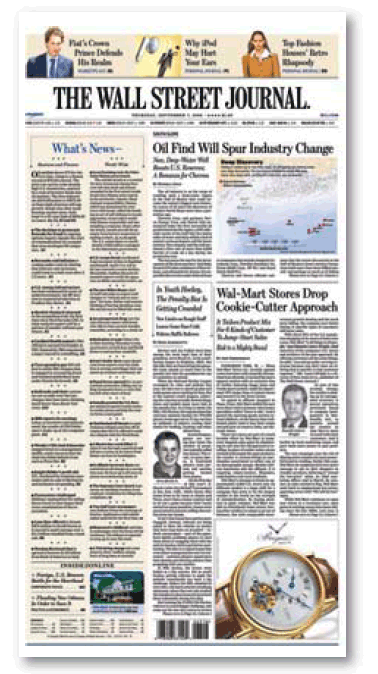The following memo was sent by Wall Street Journal managing editor Robert Thomson to the paper’s staff to further explain to reporters how they will now file breaking news stories.
It follows a memo Thomson sent on March 19 in which he states that the paper’s reporters will now be judged by how much breaking news they produce.
Dear All,
 Here is a modest introduction drafted by Neal Lipschutz and Gerry Baker to the new system of filing scoops, scheduled to be implemented on April 15. For some of the more seasoned among you, the format will be strikingly familiar –- until recent years, WSJ journalists were customarily expected to file for the Newswires. We now have an added incentive with the income inclemency in the news industry, but the fundamental goal is connecting instantly the best of WSJ news with our broader network and new platforms.
Here is a modest introduction drafted by Neal Lipschutz and Gerry Baker to the new system of filing scoops, scheduled to be implemented on April 15. For some of the more seasoned among you, the format will be strikingly familiar –- until recent years, WSJ journalists were customarily expected to file for the Newswires. We now have an added incentive with the income inclemency in the news industry, but the fundamental goal is connecting instantly the best of WSJ news with our broader network and new platforms.
Robert.
Filing URGENTS and UPDATES
URGENTS report breaking news. This is genuine, proprietary Wall Street Journal journalism. Of highest value is news that might affect a decision to buy or sell a stock, bond, bar of gold or barrel of oil. Scoops, exclusive interviews, news that arises during press conferences not covered live by TV or radio, and exclusive interviews with CEOs are all examples of URGENTS. Newswires subscribers have very granular interests, so some industry or company news that a Journal reporter might not think relevant for the WSJ Franchise could be extremely relevant for Newswires. (However, an economic report, a company press release, an analyst’s report or a publicly issued statement by a government official is not material for an URGENT.)
URGENTS are to be considered the first outlet for our journalism. We do not hold stories for publication either later that day or in the next day’s paper unless there is an absolutely compelling case to do so. The bar for this judgment will be set very high. In all cases, a request to delay publication must be referred instantly to the Hub, where Journal, Online and Newswires editors will collectively decide whether to approve a delay.
URGENTS are to be filed READY FOR PUBLICATION. URGENTS are not rough first drafts. They will be published essentially as they appear. The writing may be workmanlike – don’t trade speed for polish – but the stories must not contain errors. The premium on accuracy for URGENTS cannot be overstated. Of course, errors must be corrected as aggressively and quickly as possible, but errors do risk damaging the reputation of Dow Jones and the Journal, and corrections slow publication.
URGENTS are not to include comments, notes, editing comments/questions, queries to the desk from reporters, queries to reporters from the desk, etc.
URGENTS also will be automatically routed to WSJ.COM, so there is no need to file separately to the website. Emailing an URGENT fills every immediate news need.
UPDATES: Right now, many stories are filed to real-time outlets that, while important, don’t meet the test of urgency that is required by the new category of scoops. Still, we want to make these stories available in an easy way to Online, Newswires and others. They just need a new label and address. They will be called UPDATES.
Value-added earnings stories, analyses of all sorts and new information to enhance an already existing story all qualify as UPDATES. Filing UPDATES helps distinguish us through all of our outlets.
New Address:
As of April 15, we will be retiring the old addresses used to distribute real-time news, including SPEEDY and WSJCOPY. They remain in place until then. We will replace them with a single address that will be circulated in a separate email closer to the date. In a departure from our old system, URGENTS and UPDATES will be filed to the same email address, but distinguished by the contents of their subject lines.





